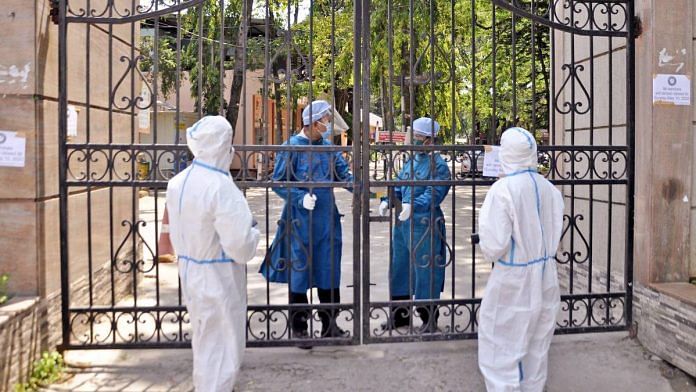New Delhi: Nearly 70 per cent of India’s cancer patients could not access life-saving treatment because of the Covid-19 pandemic, according to estimates reported by scientists, including those from the Indian Council of Medical Research (ICMR).
The pandemic is also believed to have caused an overall decline of 50 per cent in cancer services in April and May, while at least 51,100 life-saving cancer surgeries were cancelled from the end of March to the end of May.
“… nearly 70% of patients could not access life-saving surgeries and treatment. Chemotherapy treatments and follow-ups were postponed. Even private clinics in major Indian cities reported a nearly 50% decrease in patient footfall for cancer care and diabetes from the numbers they saw earlier. Overall cancer services declined by 50% in April and May, as compared with the same period the year before (data from leading private cancer hospitals across India),” the scientists, including Dr Ravi Mehrotra, chief executive officer of the India Cancer Research Consortium (established by ICMR), wrote in an article in The ASCO Post.
The ASCO Post is a science newspaper established in 2010 in partnership with the American Society of Clinical Oncology (ASCO).
“As for surgeries, only one-fifth of them were performed, compared with those performed in the corresponding period in 2019. And at least 51,100 life-saving cancer surgeries were cancelled in India from the end of March to the end of May.
“Failing to attend regular cancer care follow-up, not being able to attend the scheduled emergency surgeries, and not being able to reach home after chemotherapy were some of the common problems that resulted in the loss of life in certain cases,” the article stated.
Dr Rakesh Chopra, a medical oncologist, and Dr Kavita Yadav, a public health researcher at the Centre for Social Medicine and Community Health, Jawaharlal Nehru University, were the co-authors of the paper. Dr Mehrotra is a former director of the National Institute of Cancer Prevention and Research.
Also read: India lagging in cervical cancer prevention, needs more screening, vaccination, experts say
Lessons must be learnt
Dr Mehrotra told ThePrint that instead of looking at negatives, it is important to draw long-term lessons from the pandemic.
“We have reviewed the position for the last eight months or so in the paper, but I think this pandemic is an excellent opportunity to strengthen our health system for the future. Instead of spending 1 per cent of the GDP on health, ideally we should spend three to five times that amount,” he said.
“It is important to take lessons for the future and also build on some of the things that were done. During the pandemic the government stopped sale of smokeless tobacco, prohibited spitting. Why not take this opportunity to stop smokeless tobacco sale for good? Covid is now a chronic infection, it will not go away any time soon,” he added.
The article also draws up estimates of how much other health services have been hit by the pandemic and the subsequent lockdown.
“The National Health Mission reported a 69% reduction in measles, mumps, and rubella vaccination in children; a 21% reduction in institutional deliveries; a 50% reduction in clinic attendance for acute cardiac events; and a surprising 32% decrease in inpatient care for pulmonary conditions in March 2020 compared with March 2019,” the researchers wrote.
Also read: 27.1% of India’s all cancer cases in 2020 will be tobacco-related, ICMR report estimates
Concern about possible fund cuts
The trio also expressed concern about the “huge backlog” of cancer patients in need of care even though hospitals such as Tata Memorial in Mumbai have stepped up operations since unlocking began.
“On the one hand, hospitals are struggling with the increased burden of patients with COVID-19, and, on the other hand, management of the backlog cases has created a mammoth task for them,” they wrote.
“Hospitals not only need to take precautionary measures (wearing personal protective equipment), but also need to follow minimalistic rules (eg, reducing the number of attendants with each patient, reducing the number of visitors for inpatients, and using online or telephonic routes for routine follow-up),” they added.
Further, they predicted that the estimated decrease in cancer funding in India ranges from 5-100 per cent. The private/charity sector is the worst hit, with an estimated decrease of more than 60 per cent of its funding.
“In contrast to these findings, overly ambitious announcements earlier in the year (eg, launching a coronavirus vaccine by August 15) presented a rather hazy picture of the future,” they stated.
Also read: Exploring ayurveda for cancer treatment — the 2+2 India-US pact you didn’t hear about



